This pleasantly deranged promo video for Maximum The Hormone's "Bikini Sports Ponchin" was directed by Kouki Tange (Yellow Brain).
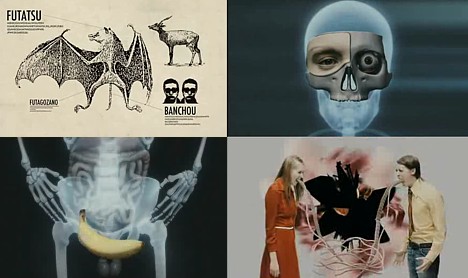
This pleasantly deranged promo video for Maximum The Hormone's "Bikini Sports Ponchin" was directed by Kouki Tange (Yellow Brain).

In the early 1970s, artist Kazuaki Saito's fantastic alien landscape illustrations graced the covers of SF Magazine, Japan's first successful and longest running science fiction periodical.
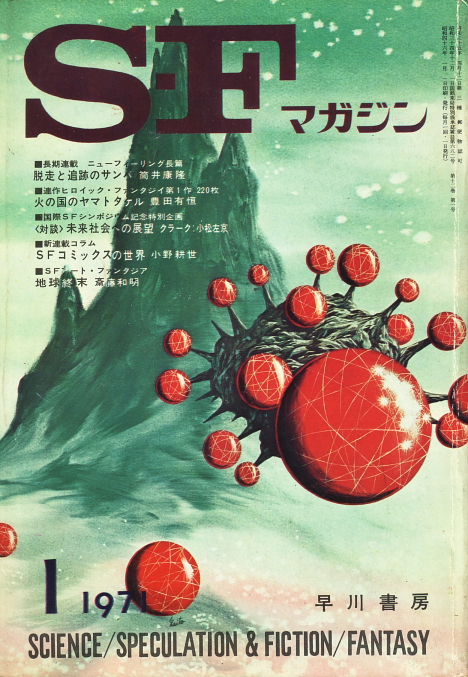
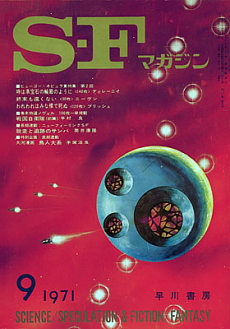
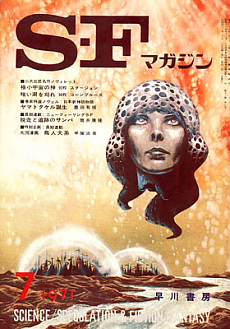
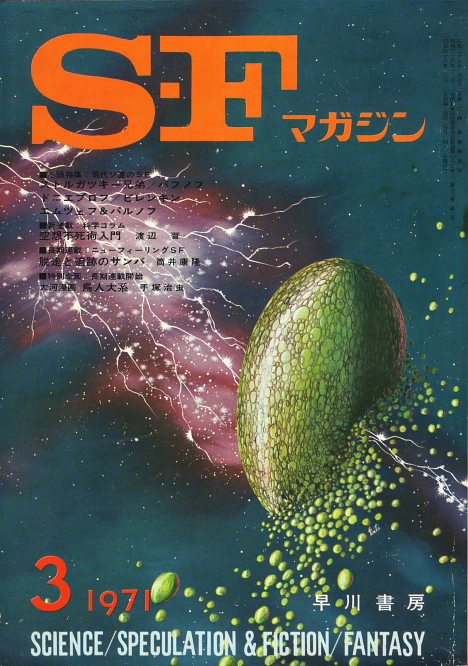
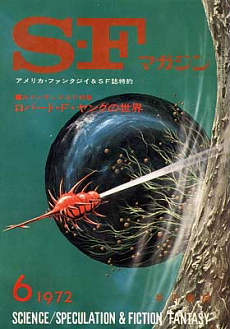
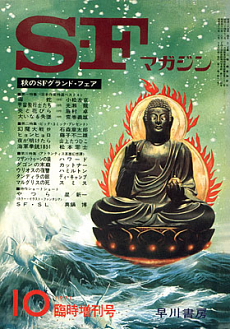
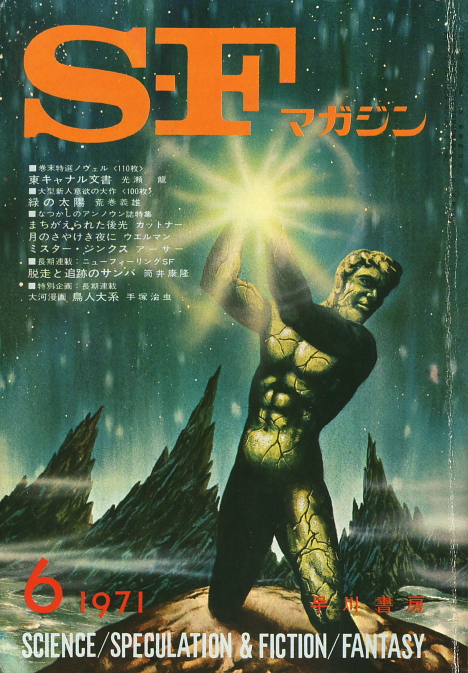
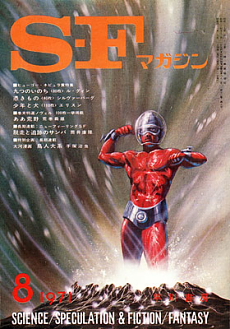
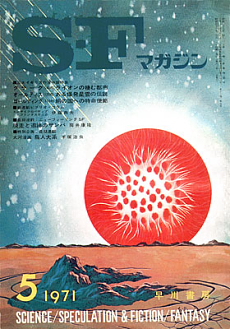
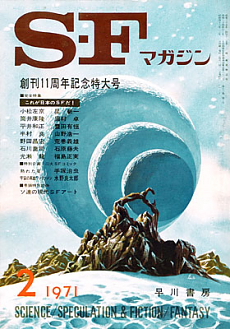
[More: SF Magazine review]
Of the countless trains running on Japan's 20,000-kilometer (12,000-mile) rail network, a few are decorated with images of anime and manga characters, colorful ads, and designs by notable artists. Here is a small sample.
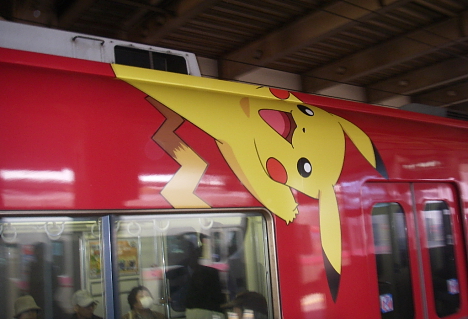
Pikachu on Seto line, Aichi prefecture
* * * * *
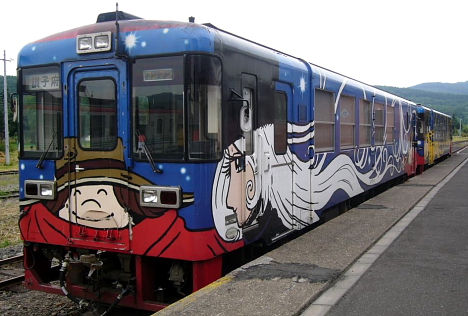
Galaxy Express 999 train, Furusato-Ginga line, Hokkaido [Photo]
Characters from Leiji Matsumoto's "Galaxy Express 999" anime/manga adorn this train that used to run on the Furusato-Ginga line in Hokkaido. The train line closed down in 2006.
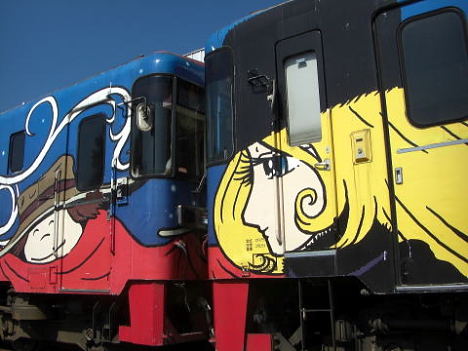
Galaxy Express 999 train, Furusato-Ginga line, Hokkaido [More photos]
* * * * *
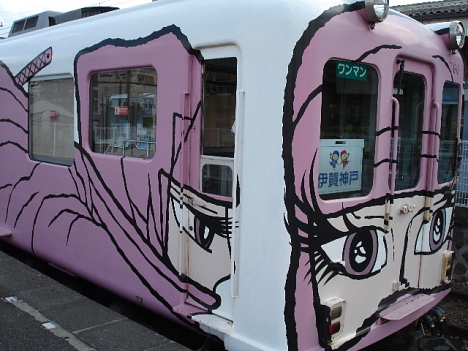
Pink ninja train, Iga line, Mie prefecture [Photo]
Matsumoto also created a series of ninja train designs for the Iga line in Mie prefecture, the birthplace of ninjutsu.
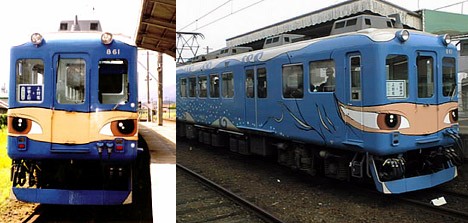
Blue ninja train, Iga line, Mie prefecture [Photo]
Here's some video of the ninja trains cruising the Mie countryside:
* * * * *
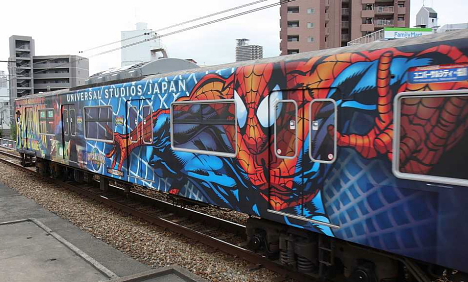
Spiderman train, JR Yumesaki line, Osaka [Photo]
* * * * *
Some trains on the Kakogawa line in Hy?go prefecture feature designs by graphic artist Tadanori Yokoo. Yokoo was born in Hy?go.
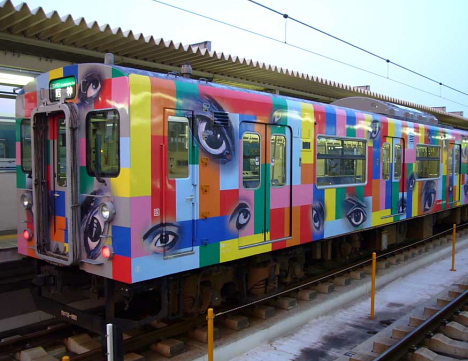
Yokoo's eyeball train, Kakogawa line, Hy?go prefecture [More]
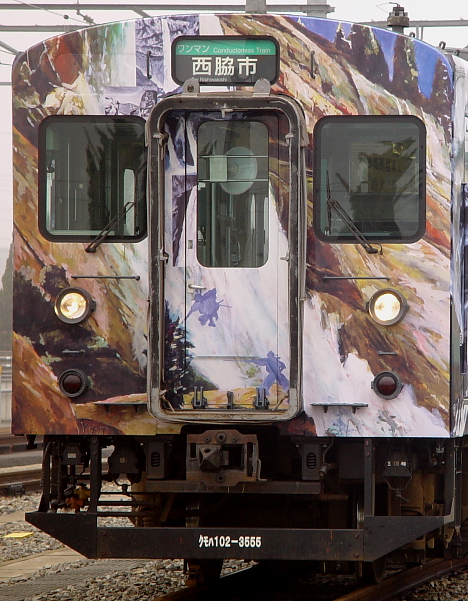
Yokoo's waterfall train, Kakogawa line, Hy?go prefecture [More]
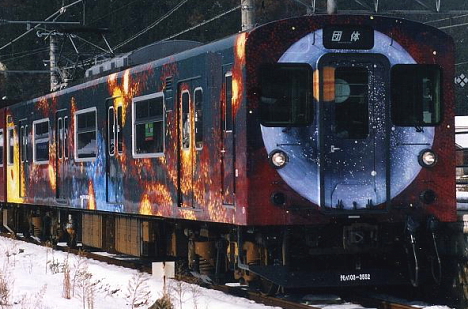
Yokoo's galactic travel train, Kakogawa line, Hy?go prefecture [Photo]
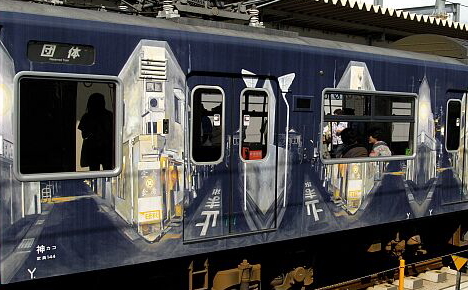
Yokoo's Y-junction train, Kakogawa line, Hy?go prefecture [More]
* * * * *
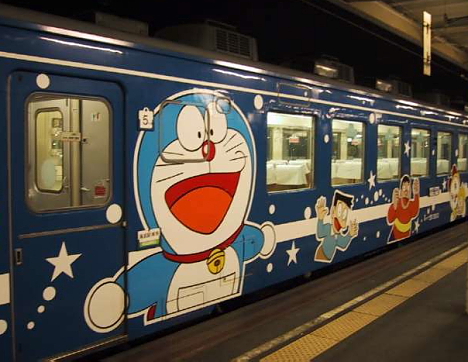
Doraemon train, Seikan Tunnel Tappi Shak? Line, Hokkaido [Photo]
This Doraemon train runs back and forth through the Seikan Tunnel, an undersea railway connecting Honshu and Hokkaido.
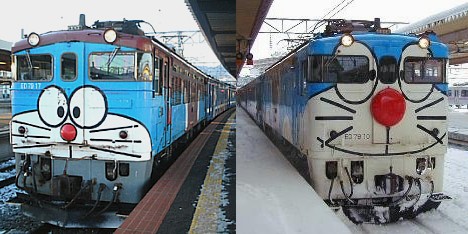
More Doraemon trains in Hokkaido
* * * * *
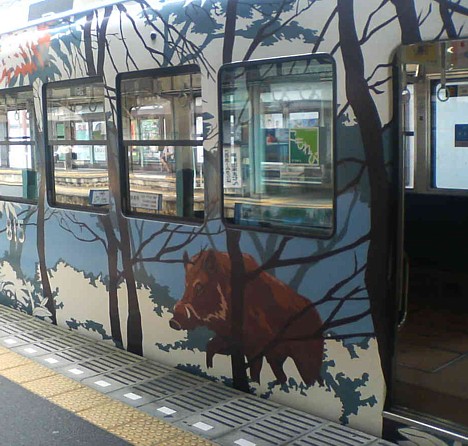
Wild boar decoration, Eizan line, Kyoto prefecture [Photo]
* * * * *
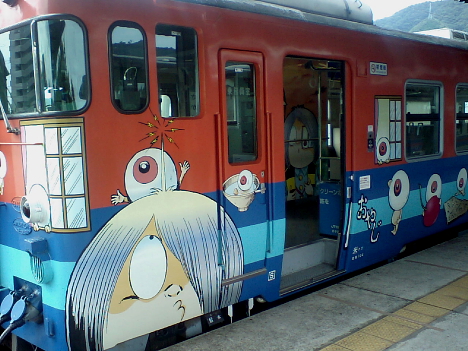
Kitar? train, Tottori line, Tottori prefecture [More]
Trains on the Tottori line in Tottori prefecture are decorated with characters from Shigeru Mizuki's "GeGeGe no Kitar?" manga/anime series. Mizuki was born in Tottori prefecture.
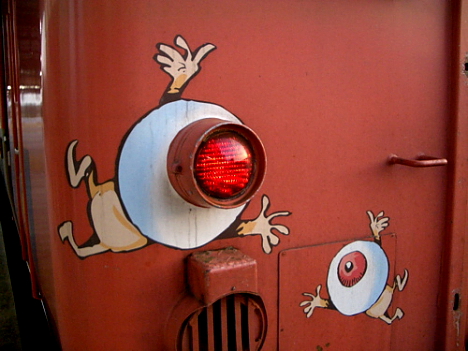
Medama-oyaji on Kitar? train, Tottori line [More]
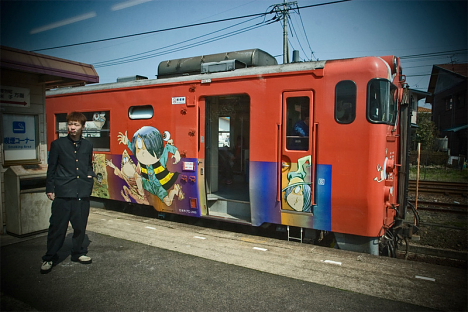
Kitar? train, Tottori line [Photo]
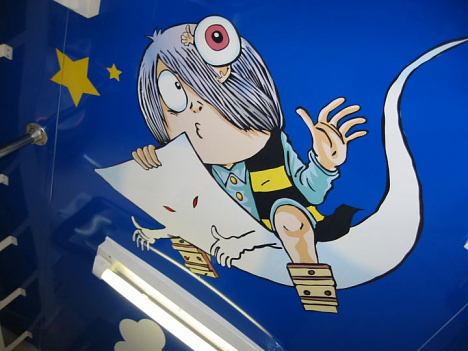
Ceiling inside Kitar? train, Tottori line [More]
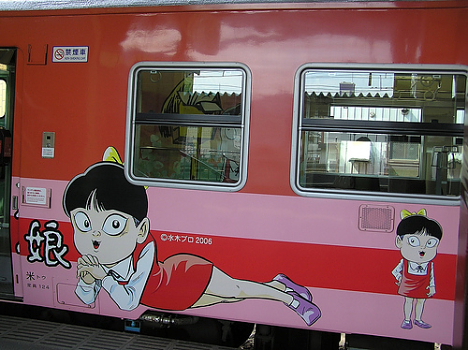
Neko-musume train, Tottori line [Photo: Rie Nakaya]
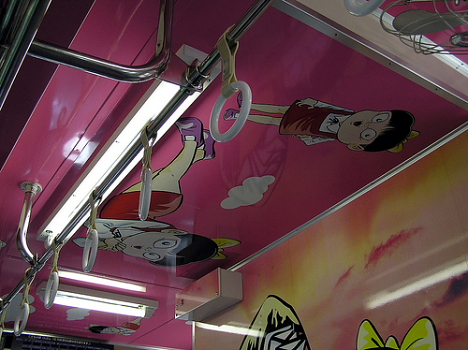
Ceiling inside Neko-musume train, Tottori line [Photo: Rie Nakaya]
* * * * *
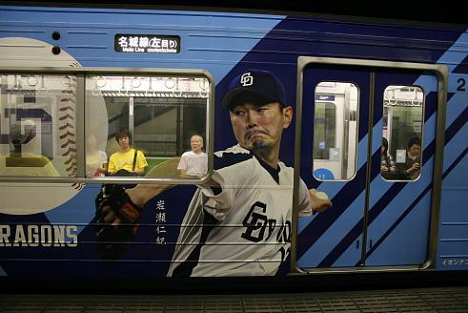
Chunichi Dragons subway, Nagoya [Photo]
* * * * *
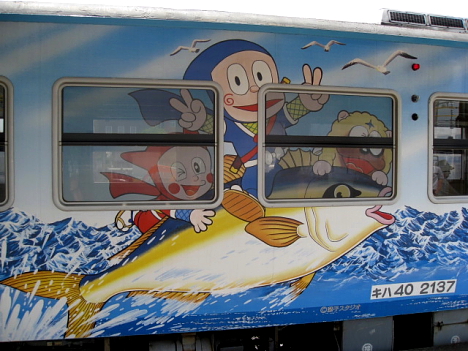
Ninja Hattori-kun train, Himi line, Toyama prefecture [Photo]
* * * * *
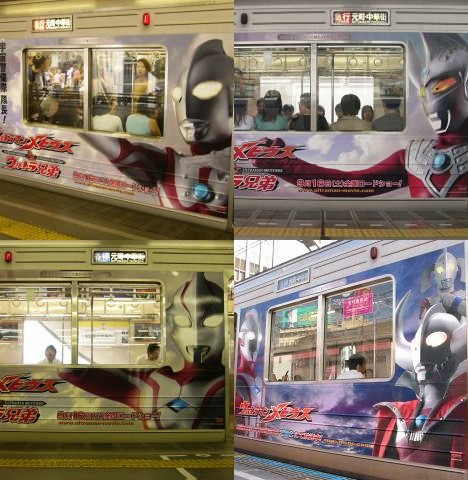
Ultraman trains, Tokyu Toyoko line, Tokyo [More]
These trains on the Tokyu Toyoko line in Tokyo were decorated to commemorate Ultraman's 40th anniversary and promote a movie.
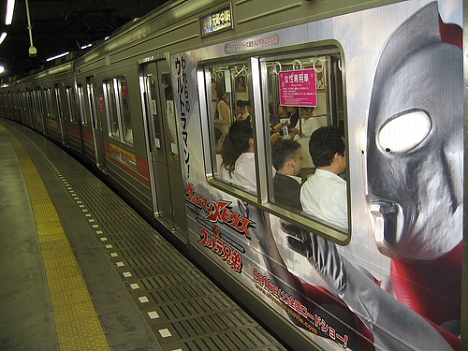
Ultraman train, Tokyo Tokyo line, Tokyo. [Photo: sanchome]
* * * * *
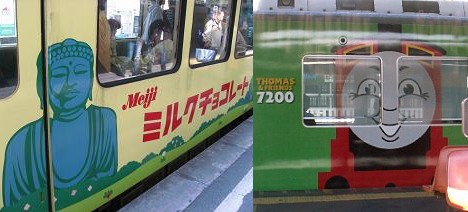
Meiji Milk Chocolate ad (Enoshima) // Thomas train (Kyoto prefecture)
* * * * *
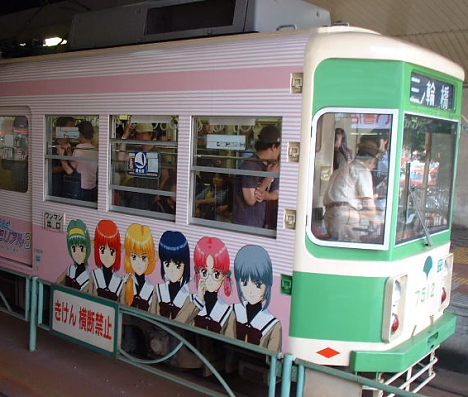
Ad for Tokimeki Memorial 3, Tokyo-Arakawa line, Tokyo [More]
* * * * *
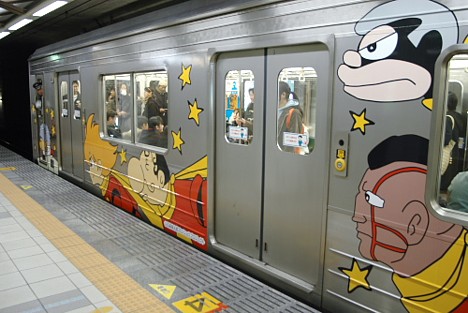
Cyborg 009 train, Senseki line, Miyagi prefecture [Photo]
Miyagi prefecture is the birthplace of manga/anime artist Ishinomori Sh?tar?, whose works include Cyborg 009 and the Kamen Rider Series. Some of his characters adorn trains on the Senseki line.
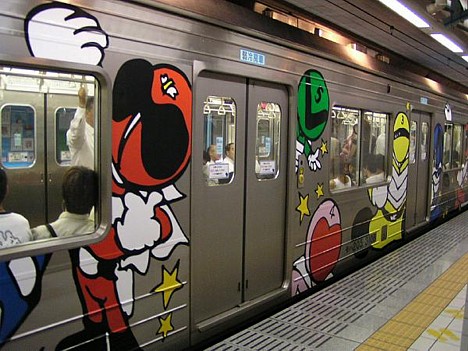
Himitsu Sentai Goranger train, Senseki line, Miyagi prefecture [More]
* * * * *
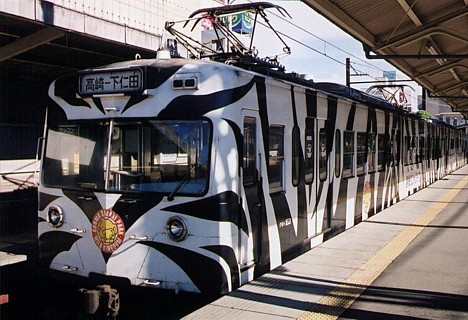
Gunma Safari Park ad train, Joshin line, Gunma prefecture [Photo]
* * * * *
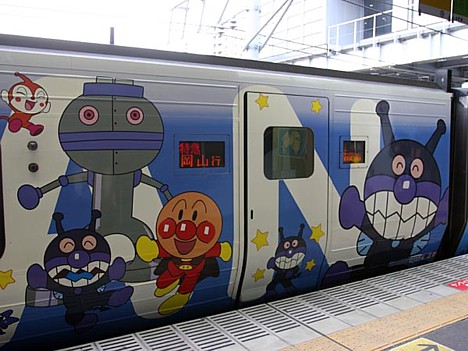
Anpanman train, JR Shikoku, Shikoku [Photo, More]
Yanase Takashi, creator of the Anpanman anime series, is from Kochi prefecture in Shikoku. The JR Shikoku railway network operates some Anpanman-themed trains.
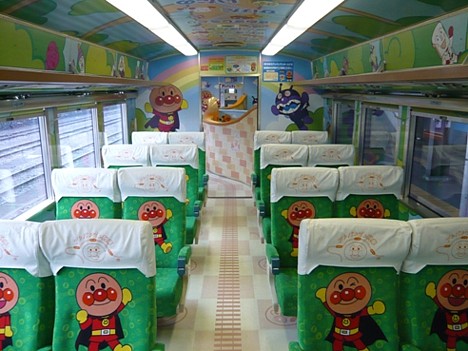
Anpanman train interior, JR Shikoku, Shikoku [More]
* * * * *
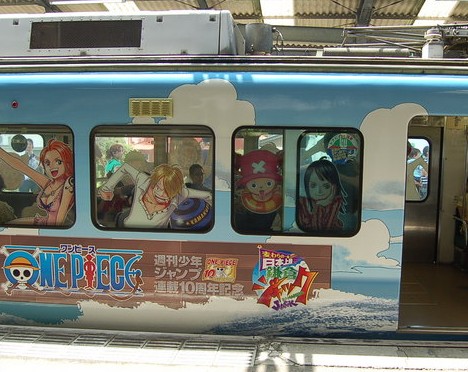
One-Piece ad train, Enoshima Electric Railway [More]
* * * * *
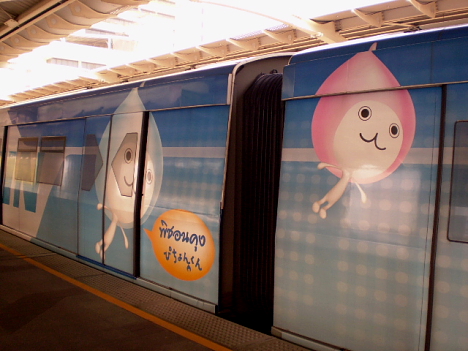
Pichon-kun on the Skytrain, Bangkok, Thailand [Photo]
Japanese characters can occasionally be found on trains in other countries. This photo shows Pichon-kun, the robot mascot of Japanese air-conditioning manufacturer Daikin, on the side of the Skytrain in Bangkok, Thailand.
* * * * *
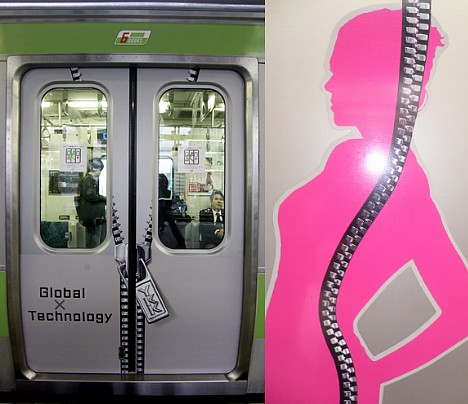
YKK train ad, Yamanote line, Tokyo [Photo]
* * * * *
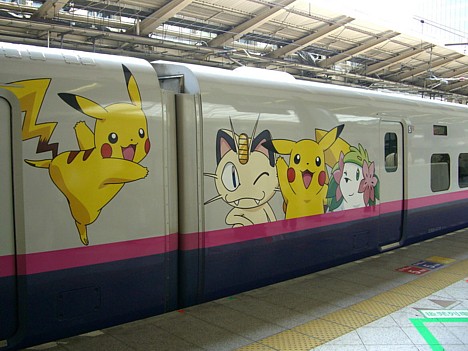
Pokemon on Tohoku Shinkansen [Photo]
Milky white blockheads, lizardmen and assorted geometrical objects get their wiggle on in this quirky stop-motion animation short by Katsushi Bowda.
For an extra dose, see Bowda's surreal sequence from Winter Days, a 2003 collaborative animated film based on a renku (collaborative poem) by 17th-century Japanese poet Bash?.
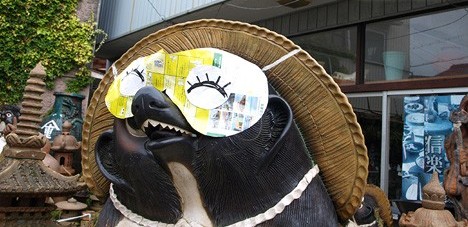
The town of Shigaraki -- the de facto tanuki statue capital of Japan -- has decided to give their favorite creature a well-deserved break. The local tourist association recently designated November 8 as Tanuki Day, a day of rest and relaxation for the tanuki.
Ceramic tanuki statues are a common sight in Japan. As a symbol of good luck and fortune, they are often placed at the entrances to restaurants and bars to beckon customers and bring prosperity. Tanuki Day is meant as an opportunity to pay homage to this honorable work.
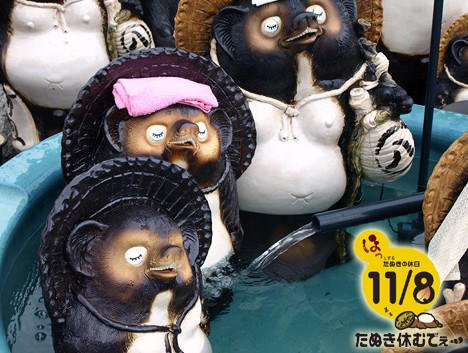
Shigaraki celebrated the new annual holiday for the first time this year. Tanuki statues across town could be seen resting and playing, though most of them chose to sleep the day away. Many wore eye masks, while others had special stickers affixed to their eyes that made them look asleep. Some just lay down on the ground and curled up under blankets.
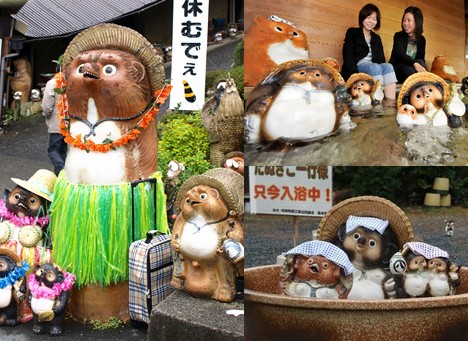
Those that remained awake celebrated by drinking alcohol, soaking in special baths, picnicking under the autumn leaves, and even playing sports. Some tanuki were dressed in beach attire and had suitcases placed next to them.
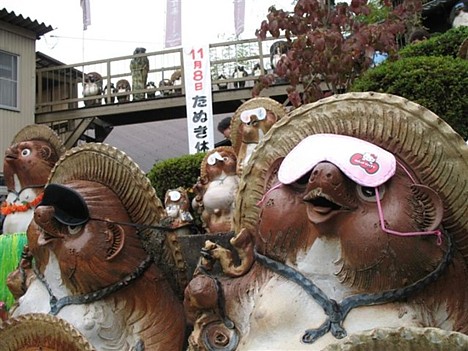
Fumito Ogawa, a local resident who runs a small inn, is credited with the original idea for the holiday. "We wanted to give the tanuki some rest and let them enjoy the other charms that Shigaraki has to offer," he explained.
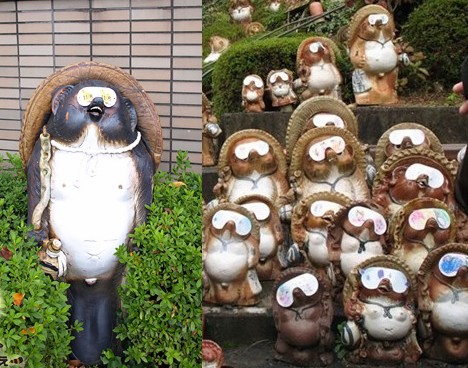
Famous for its long history of pottery-making, the Shigaraki area is the birthplace of Shigaraki ware, a ceramic style that developed in the Nara period (AD 710 to 794). The town began producing ceramic tanuki during the Edo period (AD 1603 to 1868) but did not achieve widespread fame until the Showa Emperor composed a poem about the tanuki statues he saw there on a visit in November 1951.
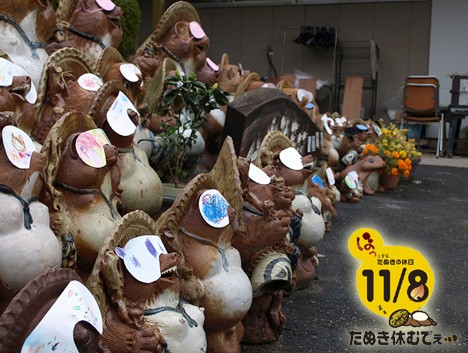
Organizers chose November 8 as the date for the holiday because the emperor made his famous visit in November and because the tanuki has eight special traits that bring good fortune.
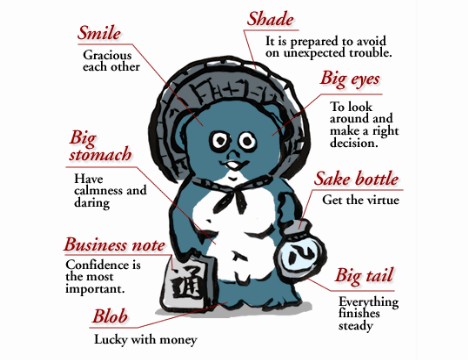
The eight traits are: (1) a bamboo hat that protects against trouble, (2) big eyes to perceive the environment and help make good decisions, (3) a sake bottle that represents virtue, (4) a big tail that provides steadiness and strength until success is achieved, (5) over-sized testicles (referred to as "blob" in the illustration above) that symbolize financial luck, (6) a promissory note that represents trust, (7) a big belly that symbolizes bold decisiveness, and (8) a friendly smile.
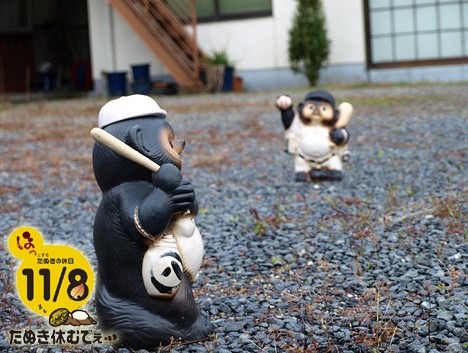
"People have come up with all sorts of ideas to help the tanuki relax," says Ogawa. "To see tanuki in the limelight is a fresh reminder of their greatness."
[Sources: Asahi, Tanuki Day blog]
Contemporary Japanese visual artists tweaked the genes of Osamu Tezuka's manga characters in dozens of works featured at the recent "Tezuka Gene - Light in the Darkness" exhibit at Parco Factory in Shibuya. Here is a small selection.
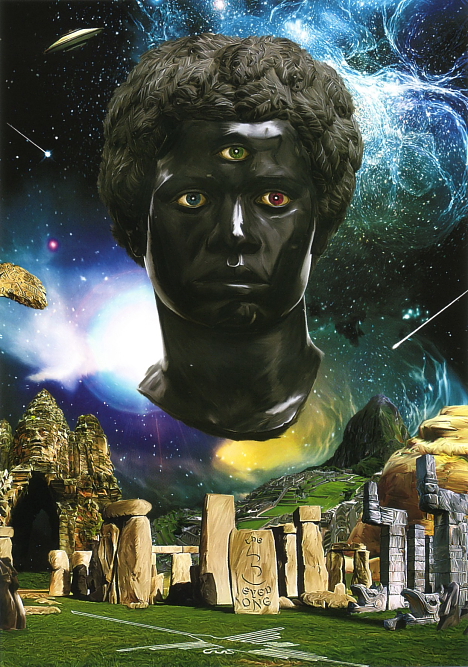
The Three-Eyed One (Enlightenment)
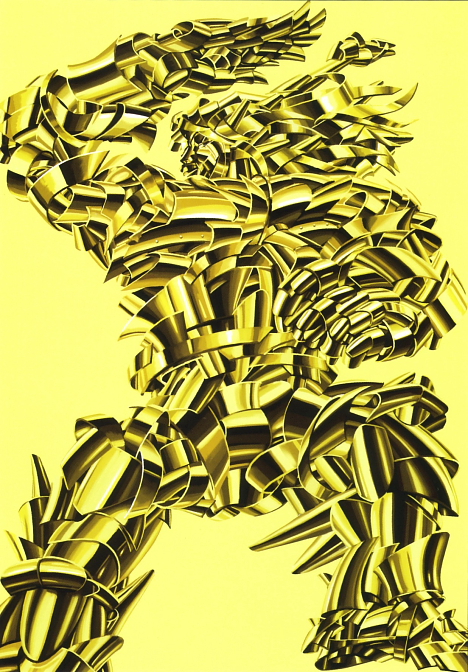
Ambassador Magma (Yutanpo Shirane)
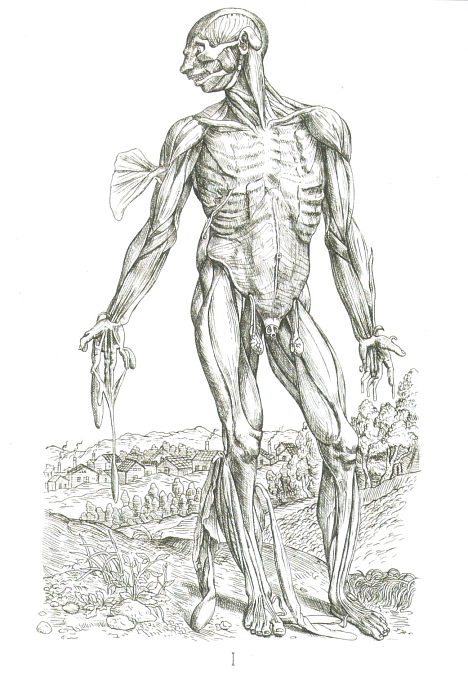
Ode to Kirihito (Motohiko Odani)
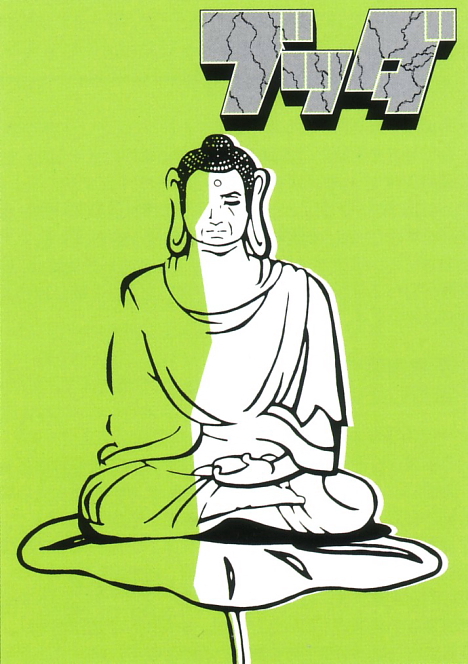
Buddha (Junichi)
Eleven winners of the "Japanese New Souvenir" competition -- a public contest to recognize novel souvenir concepts that creatively express elements of Japanese culture -- were exhibited last weekend as part of the Design Touch festivities at the Tokyo Midtown complex. Coming soon to a souvenir shop near you.
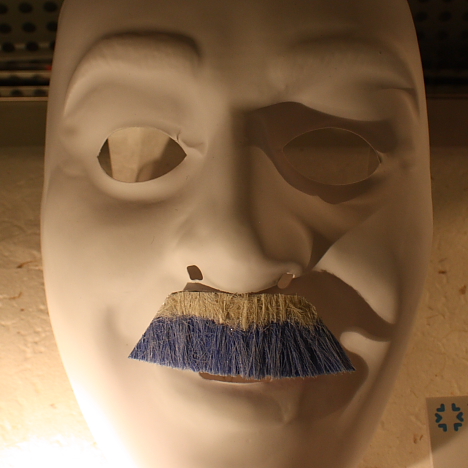
Moustache Fuji (Mariko Takeuchi)
"Moustache Fuji," a fake moustache resembling a snow-capped Mt. Fuji, is a subtle but bold fashion statement that pays homage to Japan's most sacred landmark. Described as a "moustache communication tool," this fun-to-wear facial accessory lets you inject a little Japanese flair into meetings, parties and summits.
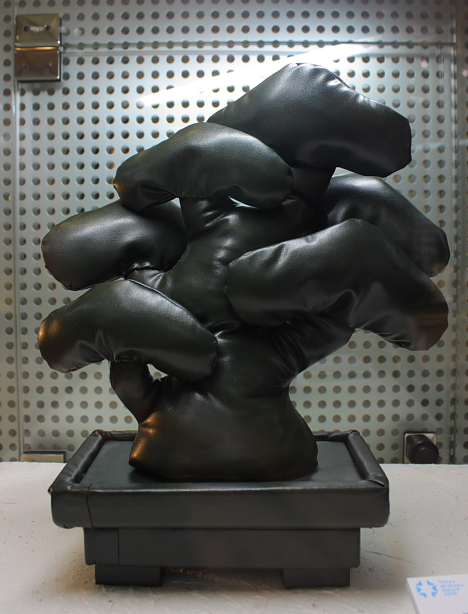
Air-Bonsai (Wabisabi)
"Air-Bonsai," a vinyl toy shaped like a potted dwarf pine, gives the traditional Japanese art of bonsai a pop-culture makeover. The soft vinyl tree packs flat into your suitcase for easy transport home.
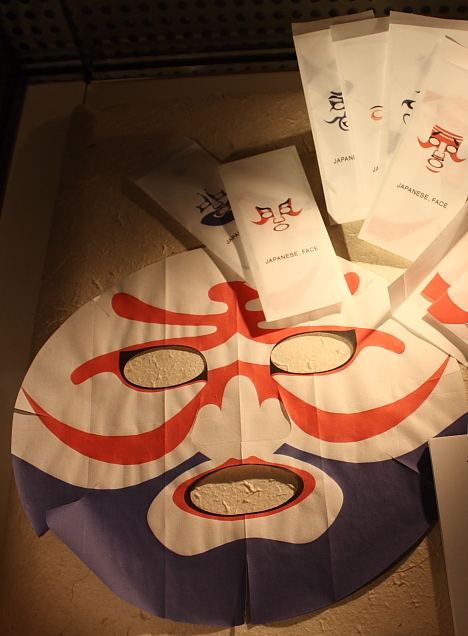
Japanese, Face (Kozue Kojima)
These "Japanese, Face" beauty masks moisturize the skin while giving you a traditional Japanese kabuki-esque appearance.
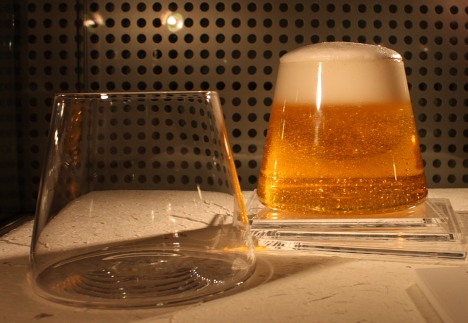
139 Views of Mt. Fuji (Keita Suzuki)
Inspired by Hokusai's famous "36 Views of Mount Fuji" series of woodblock prints, the "139 Views of Mt. Fuji" drinking glass lets you reflect on the ephemeral beauty of Mt. Fuji and the Japanese seasons while you drink. Enjoy a different "view" of the mountain with each new type of beverage you pour.
Other top souvenir concepts (not pictured) include "Kutsu-kutsushita" socks colored to look like shoes, incense sticks tied into traditional mizuhiki knots, and a round red "Hinomaru" paperweight that instantly transforms a stack of paper into the Japanese flag.
In addition to cash prizes, the winning designers will receive active support to help turn their concepts into marketable products. The contest was organized by Tokyo Midtown Design Hub, a consortium of industrial designers, graphic designers and educators focused on promoting Japanese design.
Jemapur - Maledict Car (Dir. Kosai Sekine)
Tokyo gets mirror-tweaked to kaleidoscopic effect in Jemapur's "Maledict Car" video directed by Kosai Sekine (produced by W+K Tokyo Lab). Sekine's previous work includes the quirky "Right Place," which won the best short film award at Cannes in 2006.
Mexican tattoo artist Dr Lakra is known for drawing macabre designs on found objects and images. During a visit to Japan last year, he inked hardcore tattoos on some fine antique ukiyo-e woodblock prints purchased at used bookstores. Some of these works were included in the "Goth" exhibition at the Yokohama Museum of Art in March, but a few of the more provocative tattooed shunga prints were refused because they offended museum officials.
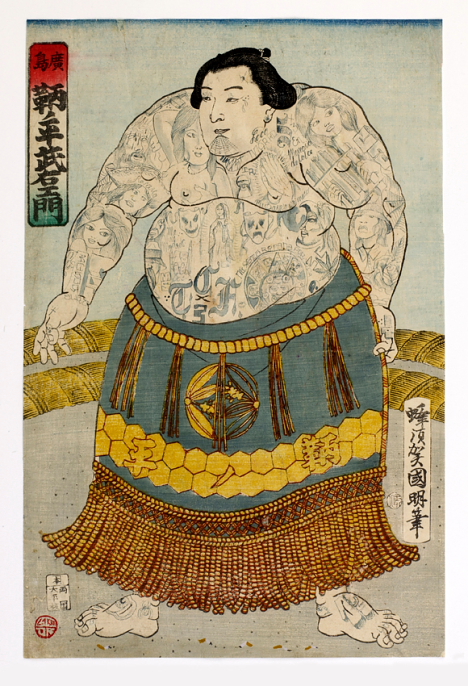
Untitled (Hiroshima Tomonohira Take-Emon)
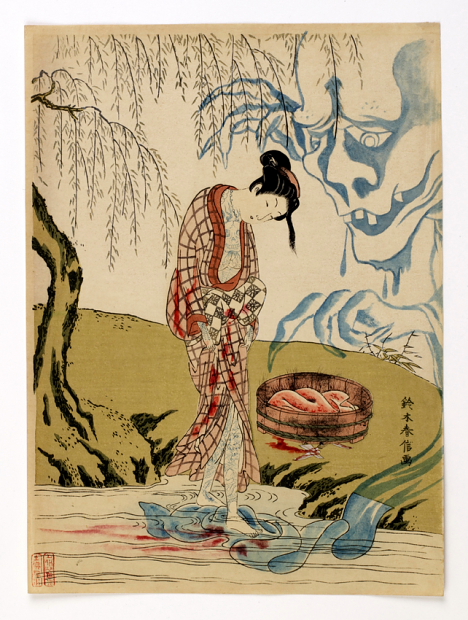
Untitled
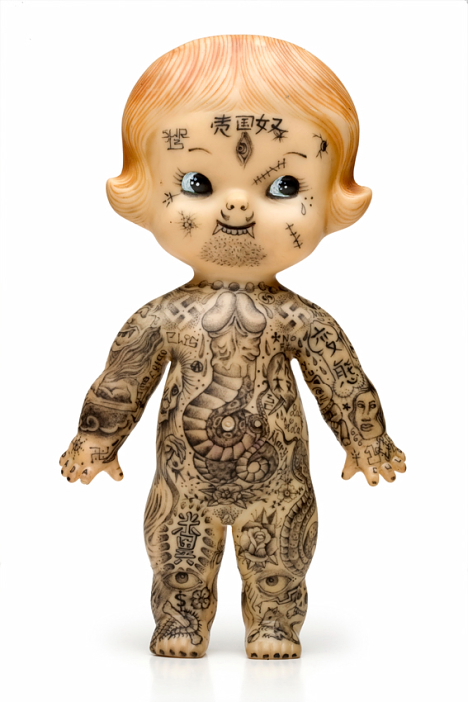
Untitled (Yokohama doll)
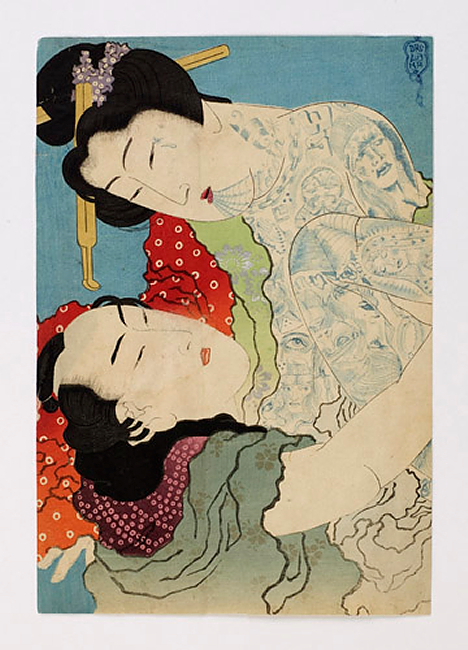
Untitled (Shunga IV)
[Images: Kate MacGarry]